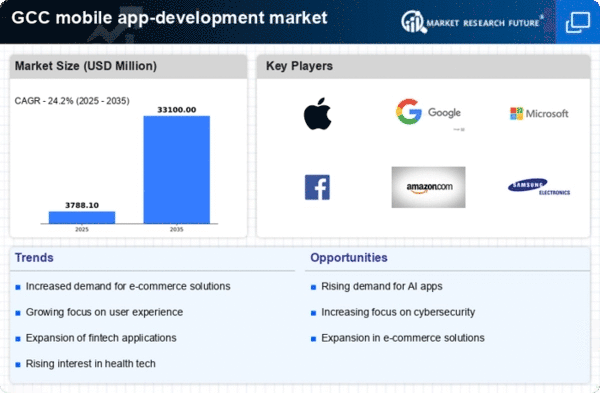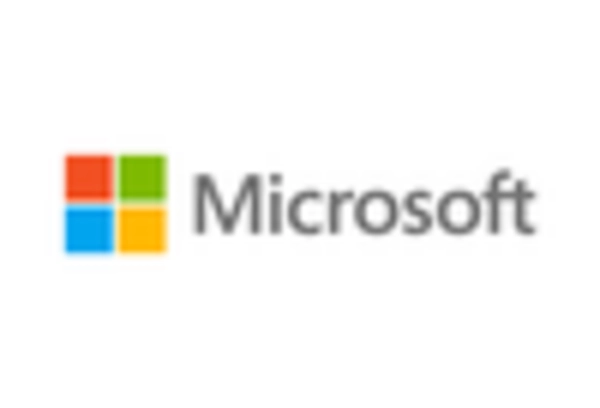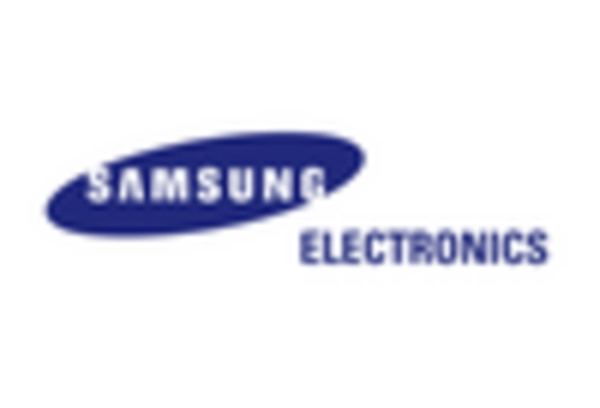Surge in Smartphone Penetration
The mobile app-development market is experiencing a notable surge in smartphone penetration across the GCC region. As of 2025, smartphone adoption rates have reached approximately 90%, leading to an increased demand for mobile applications. This trend is driven by the growing accessibility of affordable smartphones and enhanced internet connectivity. Consequently, businesses are compelled to invest in mobile app solutions to engage a larger audience. The proliferation of mobile devices has created a fertile ground for app developers, as consumers increasingly rely on mobile applications for various services, including e-commerce, entertainment, and communication. This shift in consumer behavior indicates a robust growth trajectory for the mobile app-development market, as companies strive to capitalize on the expanding user base and the potential for revenue generation through innovative app offerings.
Government Initiatives and Support
Government initiatives in the GCC region are playing a pivotal role in shaping the mobile app-development market. Various countries are implementing policies aimed at fostering innovation and entrepreneurship within the tech sector. For instance, funding programs and incubators are being established to support startups focused on mobile app development. These initiatives not only provide financial assistance but also facilitate access to resources and mentorship. As a result, the mobile app-development market is likely to witness an influx of new players and innovative solutions. Furthermore, government support for digital transformation across various industries is driving demand for mobile applications, as businesses seek to enhance their operational efficiency and customer engagement through technology. This supportive environment is expected to bolster the growth of the mobile app-development market in the GCC.
Integration of Artificial Intelligence
The integration of artificial intelligence (AI) technologies is emerging as a key driver in the mobile app-development market. Developers are increasingly incorporating AI features into mobile applications to enhance functionality and user engagement. AI-driven applications can provide personalized experiences, predictive analytics, and improved customer service through chatbots and virtual assistants. This trend is particularly relevant in the GCC, where businesses are seeking innovative solutions to differentiate themselves in a competitive landscape. The potential for AI to streamline operations and improve decision-making processes is likely to propel the mobile app-development market forward. As organizations recognize the value of AI in enhancing app capabilities, the demand for AI-integrated mobile applications is expected to grow, thereby influencing the overall market dynamics.
Rising Demand for E-Commerce Solutions
The mobile app-development market is witnessing a rising demand for e-commerce solutions, particularly in the GCC region. With the increasing trend of online shopping, businesses are recognizing the necessity of mobile applications to facilitate seamless transactions and enhance customer experiences. As of 2025, e-commerce sales in the GCC are projected to reach $30 billion, indicating a substantial market opportunity for app developers. Companies are investing in mobile apps that offer user-friendly interfaces, secure payment options, and personalized shopping experiences. This shift towards mobile commerce is not only transforming consumer behavior but also driving the growth of the mobile app-development market. As businesses strive to remain competitive, the development of robust e-commerce applications is becoming a strategic priority, further fueling market expansion.
Shift Towards Subscription-Based Models
The mobile app-development market is experiencing a shift towards subscription-based models, which is reshaping revenue generation strategies for developers. This trend is particularly pronounced in the GCC, where consumers are increasingly willing to pay for premium app features and services. Subscription models offer developers a steady stream of revenue while providing users with continuous access to updated content and functionalities. As of 2025, it is estimated that subscription-based apps will account for over 40% of total app revenue in the region. This shift not only benefits developers but also enhances user retention and engagement, as consumers are more likely to remain loyal to apps that provide ongoing value. Consequently, the mobile app-development market is adapting to this evolving landscape, with developers focusing on creating compelling subscription offerings to meet consumer demands.

















